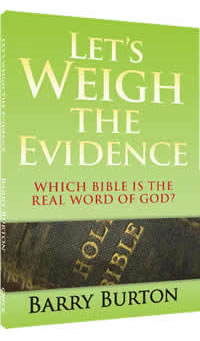'But Dad, Which One is God's Word?'
"Please turn in your Bibles to..." The pastor began his sermon. One could hear pages turning all over the building. One father watched his son, barely 9 years old, proudly open his Bible. His father had told him, "Make a habit of knowing God's Word for yourself. Never take man's word for what it says. Read it yourself."
The Words Didn't Match
But as the pastor began reading, something was very wrong! The youngster checked to be sure he had the right verse. Yes, that's the one. But the words didn't match! The pastor was reading from a new translation and, to those with limited reading ability, it sounded like another book! The boy glanced at his father, made a helpless gesture and closed his Bible. The father stared at his Bible but he wasn't following either. In his mind he was on the way home trying to answer a little boy's questions without destroying his respect for his pastor or the Word of God. "Which words were really God's words, after all?" he wondered.
All over the auditorium, Bibles could be heard closing. The Word, for which so many had died, would go unread by the people. Instead, they would receive it from the lips of the "holy man," who understood which words were really God's. An overreaction? Maybe. That is, if one accepts the notion that the professional clergy know best about spiritual matters, and are the only ones who can be trusted to find "truth."
As more and more Bible translations are published, fewer people preach the Word with confidence. One says it one way. Another says, "I like mine better. It says..." But what does God say? Can we really choose a Bible which says what we want it to say, and still take it seriously as the Word of God? Modern translations rely upon a Greek text which rests largely on two Catholic manuscripts. One of them is so pathetically marked up with corrections it finally ended up in the trash, where it was found.
Most Agree Beautifully
The other disagrees with the first, and is missing most of chapters 9 through 13 of Hebrews. How convenient that this manuscript neglects to mention we have no further need of priests! However, the vast majority of old manuscripts agree beautifully with each other, are quoted extensively by early church leaders, and are obviously from the text accepted by the early church as correct. These manuscripts combine to form the text from which the King James Bible was translated.
The importance of the King James lies mainly in the fact that it was translated from the true text, and therefore gives us the true and error-free Word of God. Pastors need to recognize that using many translations in the church undermines the people's confidence in the written Word, and thus undermines the whole church. They need one standard text. And it would certainly help to get the right one!
- See more articles on related topics:
- Bible Versions
- King James Bible
- Chick Mail Bag
- Changes in Bible Versions
Other Articles from January/February 1990:
More on Bible Versions:
Products of Interest:
-

51 Reasons Why The King James
224 pages
Here are 51 reasons to trust that God kept His promise to preserve His own words. -

Let's Weigh the Evidence
96 pages
In simple language, this book provides the basics of the Bible version issue, showing why the King James is the only Bible you can trust. Compare the solid history of the King James Bible with the new Bibles that remove Christ’s Virgin Birth and His Second Coming. Learn about Westcott and Hort’s bait-and-switch, missing verses and words, the Living Bible’s tampering, copyright issues, and more! 
Attack, The
See the behind-the-scenes struggle to destroy the King James Bible, and how God preserved it.-

Look What's Missing!
256 pages
For years, publishers have been removing words, and even whole verses, from modern Bibles. What's missing from your Bible? Take a look!



